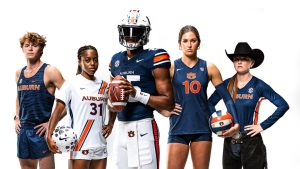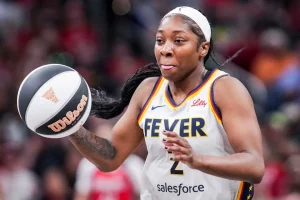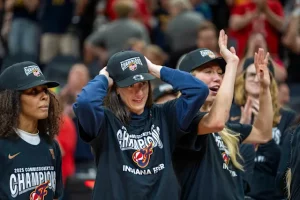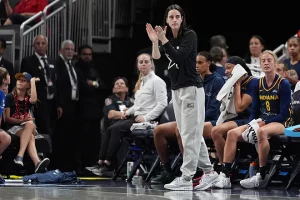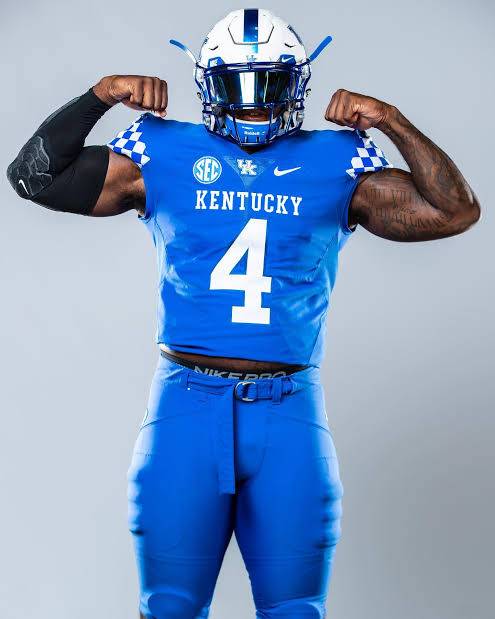
The Detroit Lions are no longer the lovable underdogs of the NFL. Under Dan Campbell’s fiery leadership and GM Brad Holmes’ savvy roster-building, Detroit has evolved into a legitimate contender with championship aspirations. But with greater expectations come tougher decisions. As the franchise eyes a Super Bowl window, one glaring underachiever is drawing uncomfortable attention.
A veteran defender, paid $7.7 million, has logged a disappointing two sacks in three seasons. Fans are frustrated. Analysts are puzzled. And now, with training camp looming and younger talent surging, Detroit faces mounting pressure to cut ties with this once-promising investment.
Chapter 1: Identifying the Problem — The $7.7M Mystery
While the team has not publicly indicated a move, multiple reports point toward Josh Paschal, a 2022 second-round pick out of Kentucky, as the likely player under scrutiny.
Paschal signed a multi-year deal worth $7.7 million, and Detroit envisioned him as a sturdy, rotational edge rusher with upside. Unfortunately, that promise never materialized.
- 2022: Rookie season hampered by injuries, 10 games, 2 sacks
- 2023: 12 games, 0 sacks
- 2024: 14 games, 0 sacks
- TOTAL: 2 sacks in 36 games played
At nearly $3.85M per sack, the return on investment has been underwhelming—especially for a defense trying to keep pace with the league’s elite.
Chapter 2: Expectations vs. Reality
When the Lions drafted Paschal, they envisioned him as a high-motor, scheme-versatile defensive end who could complement the likes of Aidan Hutchinson. He had drawn comparisons to players like Cam Jordan for his strength and technique.
But in the NFL, traits must translate. Paschal has struggled with:
- Pass-rushing technique
- Lack of bend around the edge
- Consistency against top-tier tackles
- Health (he’s missed seven games in three years)
Moreover, advanced analytics don’t flatter him:
- Pro Football Focus (PFF) grades him at under 60 in both pass rush and run defense in each of the last two seasons
- His win rate on pass-rush snaps is below 6%, compared to league average (11-12%) for edge defenders
Chapter 3: Depth Chart Squeeze
The Lions are stacked with hungry, younger edge talent that threatens to push Paschal out of the rotation.
- Aidan Hutchinson is a superstar and cornerstone
- Alim McNeill, though an interior lineman, often takes rush snaps due to his explosiveness
- Tyleik Williams, a 2025 first-rounder, brings size, youth, and energy
- Marcus Davenport, when healthy, has Pro Bowl upside
- James Houston IV has shown flashes of brilliance in limited opportunities
- Levi Onwuzurike and Roy Lopez provide hybrid looks
Paschal, on the other hand, looks increasingly out of place. With only 10 quarterback pressures all of last year and no sacks, he’s the odd man out on a defense undergoing an evolution.
Chapter 4: Financial Implications
The $7.7 million contract is not fully guaranteed. If Detroit moves on before the season:
- Dead cap hit: ~$2.4 million
- Cap savings: ~$5.3 million
That money could go toward:
- Adding veteran depth in the secondary
- Locking up key contributors like Kerby Joseph or Penei Sewell
- Signing a mid-season impact free agent for a playoff push
Brad Holmes has shown he’s not afraid to make tough financial decisions—see the Za’Darius Smith release earlier this offseason. If Paschal isn’t producing, expect Detroit to prioritize fiscal responsibility over sentiment.
Chapter 5: Locker Room Message
Cutting a second-round pick like Paschal sends a message to the locker room:
“If you don’t perform, you don’t stay.”
That ethos has been crucial to Dan Campbell’s culture shift. Veterans and rookies alike are held to the same standard. Paschal’s stagnation undermines that tone.
Contrast that with players like Hutchinson or McNeill—drafted around the same time—who have become leaders through their performance. Paschal’s failure to evolve stands in stark contrast.
Chapter 6: Trade Value?
Could the Lions trade Paschal instead of cutting him? Possibly—but the market isn’t promising.
- His production is too low to generate significant interest
- Teams know he might be cut anyway and would prefer to wait
- Best-case scenario: a Day 3 pick swap or conditional seventh-rounder
Teams like the Arizona Cardinals, New England Patriots, or Tennessee Titans—all rebuilding and thin on pass rush—could take a flier. But Detroit shouldn’t expect much in return.
Chapter 7: Public and Media Pressure
Detroit’s fans are now expecting results—not just effort. That’s new for a franchise used to moral victories. And the public spotlight is now shining brightly on underachievers.
Local columnists and national analysts alike are questioning Paschal’s roster spot:
“You can’t pay a guy $7.7M and get zero sacks.” — Detroit Free Press
“Paschal needs a career-saving camp—anything less and he’s a roster casualty.” — NFL Network
“The Lions aren’t rebuilding anymore. They don’t have time for passengers.” — The Athletic
Detroit’s fanbase, reinvigorated by postseason success and a dominant NFC North run, is watching closely. Sentiment is gone. The bar is high.
Chapter 8: What Needs to Happen for Him to Stay?
Paschal still has a sliver of hope—but the margin is razor-thin.
Path to survival:
- A dominant preseason, logging multiple sacks
- Show versatility—drop into coverage, defend the run
- Outperform a younger player on special teams
- Prove he’s irreplaceable in the film room and practice habits
If he can’t deliver in August, he likely won’t be wearing Honolulu blue in September.
Chapter 9: What Happens If He’s Released?
If Paschal is cut:
- Detroit instantly opens cap flexibility
- Depth chart opens a slot for another rookie or UDFA
- The team can aggressively scout free agents or claim waived talent
It would be a short-term blow to the ego of the front office, but Brad Holmes has built enough credibility to absorb it. More importantly, it would reinforce the team’s commitment to accountability.
Chapter 10: A Sign of a New Era in Detroit
A few years ago, Detroit might’ve kept a player like Paschal simply because he was a high pick. But this isn’t the old Lions.
This team is run like a contender. Campbell and Holmes have redefined what it means to “buy in.” Paschal’s lack of impact contradicts that philosophy.
In the past, a player might’ve been protected by pedigree. Now, you’re protected by production. And Paschal’s lack of it makes his position untenable.

